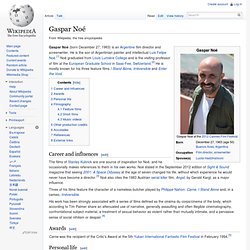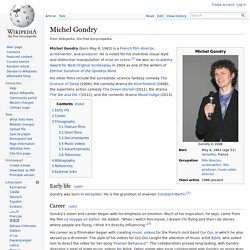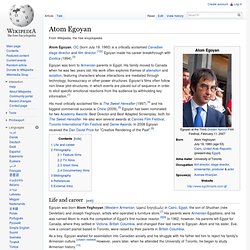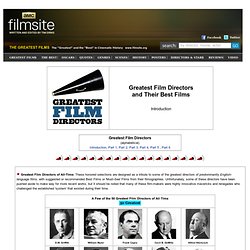

Rainer Werner Fassbinder. Spike Jonze. Wim Wenders. Wim Wenders. Pinchas Perry. Darren Aronofsky. Jacques Tati - Biography. Werner Herzog. Jacques Tati - Biography. Rainer Werner Fassbinder - Filmography by type. Darren Aronofsky - Filmography by type. Spike Jonze - Filmography by type. Wim Wenders - Filmography by type.
Frank Miller (II) - Filmography by type. Dito Montiel - Filmography by type. Pinchas Perry - Filmography by type. Gaspar Noé. Career and influences[edit] His work has been strongly associated with a series of films defined as the cinéma du corps/cinema of the body, which according to Tim Palmer share an attenuated use of narrative, generally assaulting and often illegible cinematography, confrontational subject material, a treatment of sexual behavior as violent rather than mutually intimate, and a pervasive sense of social nihilism or despair.[4] Awards[edit] Carne was the recipient of the Critic's Award at the 5th Yubari International Fantastic Film Festival in February 1994.[5] Personal life[edit] He is married to filmmaker Lucile Hadžihalilović.

Michel Gondry. Early life[edit] Career[edit] Gondry's vision and career began with his emphasis on emotion.

Much of his inspiration, he says, came from the film Le voyage en ballon. He stated: "When I watch this movie, I dream I'm flying and then I do stories where people are flying. I think it's directly influencing Gondry also directed the musical documentary Dave Chappelle's Block Party (2006) which followed comedian Dave Chappelle as he attempted to hold a large, free concert in the Bedford-Stuyvesant neighborhood of Brooklyn. According to the Guinness World Records 2004, Michel Gondry's Levi's 501 Jeans "Drugstore" spot holds the record for "Most awards won by a TV commercial".[4] The commercial was never aired in North America because of the suggestive content involving purchasing latex condoms.
In September 2006, Gondry made his debut as an installation artist at Deitch Projects in New York City's SoHo gallery district. Atom Egoyan. Egoyan was born to Armenian parents in Egypt.

His family moved to Canada when he was two years old. His work often explores themes of alienation and isolation, featuring characters whose interactions are mediated through technology, bureaucracy or other power structures. Egoyan's films often follow non-linear plot-structures, in which events are placed out of sequence in order to elicit specific emotional reactions from the audience by withholding key information.[1] Life and career[edit] Egoyan was born Atom Yeghoyan (Western Armenian: Աթոմ Եղոյեան) in Cairo, Egypt, the son of Shushan (née Devletian) and Joseph Yeghoyan, artists who operated a furniture store.[7] His parents were Armenian-Egyptians, and he was named Atom to mark the completion of Egypt's first nuclear reactor.[8][9] In 1962, however, his parents left Egypt for Canada, where they settled in Victoria, British Columbia, and changed their last name to Egoyan. He graduated from Trinity College at the University of Toronto. Greatest Film Directors of All Time.
Greatest Film Directors of All-Time: These honored selections are designed as a tribute to some of the greatest directors of predominantly English-language films, with suggested or recommended Best Films or 'Must-See' Films from their filmographies.

Unfortunately, some of these directors have been pushed aside to make way for more recent works, but it should be noted that many of these film-makers were highly innovative mavericks and renegades who challenged the established 'system' that existed during their time. These choices are meant to encourage discussion and comparison, and to educate filmgoers about some of film history's most legendary and influential forces in film-making. The premise of honoring these film directors is based upon the debatable auteur theory -- the idea that the director is the primary 'author' or voice of a movie, and through a director's film, we see one person's way of viewing the world -- one that has the potential to change the way we see the world. MichelGondry.com. Werner Herzog - Filmography by type. Frank Miller. Béla Tarr. Shin'ya Tsukamoto. Richard Linklater. David Cronenberg - Filmography by type.